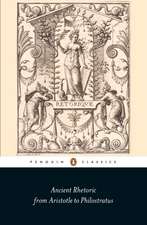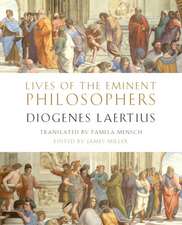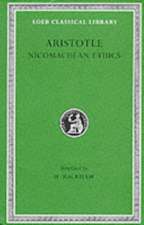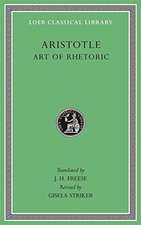Metaphysics: Ann Arbor Paperbacks
Autor Aristotle Traducere de Richard Hopeen Limba Engleză Paperback – 2 feb 1952
Aristotle's great work translated into English with an index giving Greek, Latin, and English forms of key terms
| Toate formatele și edițiile | Preț | Express |
|---|---|---|
| Paperback (9) | 67.54 lei 3-5 săpt. | |
| CREATESPACE – | 67.54 lei 3-5 săpt. | |
| Penguin Books – 28 oct 1998 | 70.61 lei 26-32 zile | +27.31 lei 7-13 zile |
| CREATESPACE – | 73.46 lei 3-5 săpt. | |
| – | 87.12 lei 3-5 săpt. | |
| CreateSpace Independent Publishing Platform – 31 mar 2012 | 92.87 lei 3-5 săpt. | |
| Hackett Publishing Company – 31 dec 1984 | 106.61 lei 3-5 săpt. | +18.97 lei 7-13 zile |
| Prometheus Books – 31 mai 1991 | 117.68 lei 3-5 săpt. | +15.33 lei 7-13 zile |
| Hackett Publishing Company,Inc – 29 feb 2016 | 208.01 lei 3-5 săpt. | +66.27 lei 7-13 zile |
| COSIMO CLASSICS – 30 oct 2008 | 113.82 lei 6-8 săpt. | |
| Hardback (3) | 231.97 lei 6-8 săpt. | |
| Hackett Publishing Company – 31 dec 1984 | 292.22 lei 3-5 săpt. | |
| Hackett Publishing Company,Inc – mar 2016 | 544.76 lei 3-5 săpt. | |
| COSIMO CLASSICS – 30 oct 2008 | 231.97 lei 6-8 săpt. |
Din seria Ann Arbor Paperbacks
-
 Preț: 206.14 lei
Preț: 206.14 lei -
 Preț: 147.30 lei
Preț: 147.30 lei -
 Preț: 162.61 lei
Preț: 162.61 lei -
 Preț: 176.77 lei
Preț: 176.77 lei -
 Preț: 156.20 lei
Preț: 156.20 lei -
 Preț: 116.28 lei
Preț: 116.28 lei -
 Preț: 198.45 lei
Preț: 198.45 lei -
 Preț: 222.42 lei
Preț: 222.42 lei -
 Preț: 297.81 lei
Preț: 297.81 lei -
 Preț: 279.68 lei
Preț: 279.68 lei -
 Preț: 129.84 lei
Preț: 129.84 lei -
 Preț: 110.88 lei
Preț: 110.88 lei -
 Preț: 117.14 lei
Preț: 117.14 lei -
 Preț: 273.41 lei
Preț: 273.41 lei -
 Preț: 121.54 lei
Preț: 121.54 lei -
 Preț: 207.09 lei
Preț: 207.09 lei -
 Preț: 123.93 lei
Preț: 123.93 lei -
 Preț: 147.92 lei
Preț: 147.92 lei -
 Preț: 305.85 lei
Preț: 305.85 lei -
 Preț: 104.90 lei
Preț: 104.90 lei -
 Preț: 179.35 lei
Preț: 179.35 lei -
 Preț: 148.22 lei
Preț: 148.22 lei -
 Preț: 211.77 lei
Preț: 211.77 lei -
 Preț: 113.83 lei
Preț: 113.83 lei - 8%
 Preț: 134.01 lei
Preț: 134.01 lei -
 Preț: 115.55 lei
Preț: 115.55 lei -
 Preț: 273.32 lei
Preț: 273.32 lei -
 Preț: 162.77 lei
Preț: 162.77 lei -
 Preț: 171.89 lei
Preț: 171.89 lei -
 Preț: 156.40 lei
Preț: 156.40 lei -
 Preț: 231.41 lei
Preț: 231.41 lei -
 Preț: 102.29 lei
Preț: 102.29 lei -
 Preț: 200.55 lei
Preț: 200.55 lei -
 Preț: 130.74 lei
Preț: 130.74 lei
Preț: 116.51 lei
Nou
Puncte Express: 175
Preț estimativ în valută:
22.29€ • 23.28$ • 18.45£
22.29€ • 23.28$ • 18.45£
Carte indisponibilă temporar
Doresc să fiu notificat când acest titlu va fi disponibil:
Se trimite...
Preluare comenzi: 021 569.72.76
Specificații
ISBN-13: 9780472060429
ISBN-10: 0472060422
Pagini: 416
Dimensiuni: 137 x 203 x 25 mm
Greutate: 0.45 kg
Editura: UNIVERSITY OF MICHIGAN PRESS
Colecția University of Michigan Press
Seria Ann Arbor Paperbacks
ISBN-10: 0472060422
Pagini: 416
Dimensiuni: 137 x 203 x 25 mm
Greutate: 0.45 kg
Editura: UNIVERSITY OF MICHIGAN PRESS
Colecția University of Michigan Press
Seria Ann Arbor Paperbacks
Recenzii
"Mr. Hope translates every term in as many ways as are required by different contexts and by Aristotle's own intended meanings, thereby producing a version that is immeasurably more intelligible than one based on the assumption that every Greek word must be rendered by a single English equivalent."
--Ben Ray Redman
--Ben Ray Redman
"The translator is to be commended for the scholarly and painstaking service which he has rendered to one of the great philosophic masterpieces of all times."
--Paul Helsel
--Paul Helsel
Notă biografică
Aristotle (Greek: ¿¿¿¿¿¿¿¿¿¿¿ Aristotél¿s, pronounced [aristotél¿¿s]; 384-322 BC)[A] was a Greek philosopher and polymath during the Classical period in Ancient Greece. Taught by Plato, he was the founder of the Lyceum, the Peripatetic school of philosophy, and the Aristotelian tradition. His writings cover many subjects. including physics, biology, zoology, metaphysics, logic, ethics, estheticspoetry, theatre, music, rhetoric, psychology, linguistics, economics, politics, and government. Aristotle provided a complex synthesis of the various philosophies existing prior to him. It was above all from his teachings that the West inherited its intellectual lexicon, as well as problems and methods of inquiry. As a result, his philosophy has exerted a unique influence on almost every form of knowledge in the West and it continues to be a subject of contemporary philosophical discussion.
Little is known about his life. Aristotle was born in the city of Stagira in Northern Greece. His father, Nicomachus, died when Aristotle was a child, and he was brought up by a guardian. At seventeen or eighteen years of age he joined Plato's Academy in Athens and remained there until the age of thirty-seven (c. 347 BC).[4] Shortly after Plato died, Aristotle left Athens and, at the request of Philip II of Macedon, tutored Alexander the Great beginning in 343 BC.[5] He established a library in the Lyceum which helped him to produce many of his hundreds of books on papyrus scrolls. Though Aristotle wrote many elegant treatises and dialogues for publication, only around a third of his original output has survived, none of it intended for publication.[6]
Aristotle's views on physical science profoundly shaped medieval scholarship. Their influence extended from Late Antiquity and the Early Middle Ages into the Renaissance, and were not replaced systematically until the Enlightenment and theories such as classical mechanics. Some of Aristotle's zoological observations found in his biology, such as on the hectocotyl (reproductive) arm of the octopus, were disbelieved until the 19th century. His works contain the earliest known formal study of logic, studied by medieval scholars such as Peter Abelard and John Buridan. Aristotle's influence on logic also continued well into the 19th century.
He influenced Islamic thought during the Middle Ages, as well as Christian theology, especially the Neoplatonism of the Early Church and the scholastic tradition of the Catholic Church. Aristotle was revered among medieval Muslim scholars as "The First Teacher" and among medieval Christians like Thomas Aquinas as simply "The Philosopher". His ethics, though always influential, gained renewed interest with the modern advent of virtue ethics, such as in the thinking of Alasdair MacIntyre and Philippa Foot.
Cuprins
The Metaphysics - Aristotle Translated with an Introduction by Hugh Lawson-Tancred
Preface
Introduction
THE METAPHYSICSBook Alpha
Book Alpha the Lesser
Book Beta
Book Gamma
Book Delta
Book Epsilon
Book Zeta
Book Eta
Book Theta
Book Iota
Book Kappa
Book Lambda
Book Mu
Book Nu
Bibliography





























